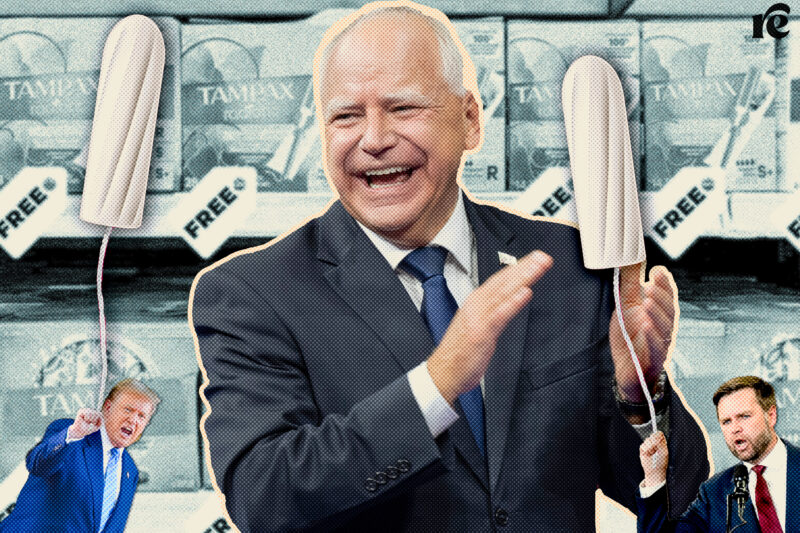Why Are Conservatives Grasping at (Tampon) Strings to Criticize Tim Walz?
Opinion: Making sure students, teachers, and staff can access necessary health-care supplies like menstrual products is exemplary—not shameful.

Within hours of Vice President Kamala Harris’ announcement that she had chosen Minnesota Gov. Tim Walz as her running mate, Donald Trump’s followers mockingly dubbed him “Tampon Tim.” Named for a recent Minnesota law that provides free menstrual products in public schools, the opposition took joy in deriding a man who signed a bill that addresses a very real public health need.
I can’t be the only one who has had to stuff scratchy, one-ply toilet paper in my underwear after an ill-timed or unexpected period while in school. In fact, I know there are others like me, because as a teen, not a month went by without a friend asking if I had a spare pad or tampon.
In the days after the Tampon Tim moniker gained momentum, many friends shared their own stories of menstrual malfunctions and humiliations, where access to free supplies would have been a lifesaver. According to Alliance for Period Supplies, which leads a national network of more than 140 independent, community-based nonprofits working to end period poverty, 86 percent of people who menstruate have started their period unexpectedly in public. So to find out that Minnesota public schools are now stocking bathrooms to ensure that students, teachers, and staff have the supplies they need? I don’t think it’s shameful in the least. It’s exemplary.
However, conservatives took a cursory look at the law and decided to run with the sensationalized spin that Walz was forcing fourth-grade boys to have tampons in their bathrooms. Grasping to find some way to sell this to their base, they infused a “trans panic” on the public health policy that states Minnesota public schools “must provide students with access to menstrual products at no charge. The products must be available to all menstruating students in restrooms regularly used by students in grades 4 to 12 according to a plan developed by the school district.” The language actually provides schools with flexibility, and nobody is being forced to use any products.
In some Minnesota school districts, including Anoka-Hennepin—the state’s largest—period products are actually not placed in any of the boys’ bathrooms, but are available in other places, like girls’ bathrooms, the nurse’s office, unisex/ungendered bathrooms, and even the main office.
When I asked my son if he had heard of the Tampon Tim nickname, he thought it had actually come from the Harris camp as a positive endorsement, and laughed at the thought of anyone using it to ridicule someone.
The shock and outrage over boys as young as 10 coming across a pad or tampon while at school is just a smokescreen for transphobia—because yes, there are most likely nonbinary or trans students, staff, and faculty who now really appreciate having access to health-care products they require. And perhaps, some schools will provide products in their boys’ restrooms, but as the mother of a teen son who “bravely” uses the bathroom in our home with unfettered access to tampons and pads of various sizes, I can tell you that the boys will be alright. Worst-case scenario, these young dudes get some free toys to play with. But best-case scenario, they grow up thinking of pads and tampons as boring and normal—because they are.
In our house, menstrual products aren’t dirty, gross, or shameful, just items needed on occasion. When I asked my son if he had heard of the Tampon Tim nickname, he thought it had actually come from the Harris camp as a positive endorsement, and laughed at the thought of anyone using it to ridicule someone.
The reality is that laws like the one in Minnesota (which was part of a larger education package) are addressing a very real need. According to a 2021 Kotex Period Poverty report, 42 percent of people said that at some point in their life they’ve struggled to purchase period products due to lack of income (a 35 percent increase from 2018 data). The report also noted that 38 percent of people who menstruate have had to miss events or activities—like school—due to a lack of access to menstrual products. Alliance for Period Supplies also reported that nearly 1 in 4 students struggle to afford these products (up from 1 in 5 in 2019), and pre-COVID-19, 4 in 5 teens reported either having missed class time or knowing a classmate who missed class because they lacked access to period products. This is a nationwide problem, and one that Minnesota lawmakers were eager to address.
Minnesota is not alone. The state joins Hawaii, California, Colorado, Connecticut, Maryland, New Jersey, New Mexico, Ohio, and Oregon in providing state-funded, free period products in public schools. Ten other states, along with Washington, D.C., require free products to be available in public schools despite not offering funding, and eight other states (including conservative-leaning ones like Alabama, Arizona, and Georgia) have no state mandates, but do provide funding for schools that want to offer free products. So while online critics may be attempting to attack Walz, more than 50 percent of states are tackling this public health need.
And these types of programs actually work. In New York City, after schools were required to provide free period supplies, there was a 2.4 percent increase in attendance.
The bottom line is that menstrual products are a basic need for over half of our population. It shouldn’t be seen as an outrageous act to ensure these products are available to those in need. After all, nobody is protesting the free toilet paper and hand soap schools are stocking their bathrooms with. Conservatives may be using “Tampon Tim” as an insult, but the rest of us see it for what it is: An understanding that nobody should have to miss out on their education because they are unable to afford a basic necessity required to thrive.
